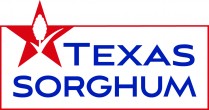- About UsTexas Grain Sorghum Association is….
- Texas Sorghum InsiderNewsletters…
- Legislative News
- Photos
- Contact UsTexas Grain Sorghum Association P.O. Box 905 Salado, TX 76571 Wayne Cleveland, Executive Director wcleveland@mindspring.com (254) 541.5375 Morgan Newsom, Producer Relations Coordinator morgan@texassorghum.org (806) 438.5994 SEND US A MESSAGE: [contact-form-7 404 "Not Found"]
- Sorghum Dashboard
- Events
June 25, 2018
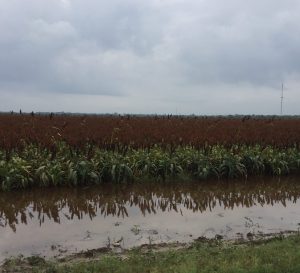
Rio Grande Valley Sorghum Crop
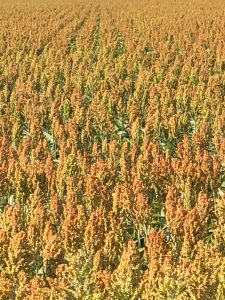
Sorghum Crop in the Coastal Bend
Texas Sorghum Crop Conditions – Flash fooding last week in the Rio Grande Valley and the Coastal Bend didn’t cause much havoc with the current crops but some parts were hit harder than others. Places in the Lower Rio Grande Valley saw up to 15 inches of rain over a few days. About 70% of the sorghum crop is harvested in the valley and the rain did minimal damage; just delaying harvest for the crops that are still in the field. The Coastal Bend is projecting to be about 80% of the volume the sorghum crop produced last year with yields averaging 6,500 to 1,000 lbs/acre and very little insect pressure. The Upper Coastal Bend looks good with above average crops and late season insect pressure. Central Texas sorghum is looking good and is projected to produce average yields. The Plains failed out approximately one million cotton acres last week with many of those acres being planted in grain sorghum this week and next week. If you are in this area and are looking to plant after failed cotton or wheat, please refer to our tips on sorghum as a secondary crop on the home page of our website.
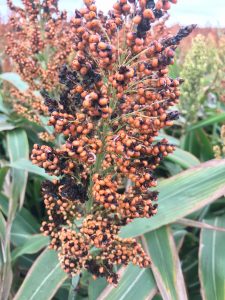
Sprout Damage in Coastal Bend Sorghum
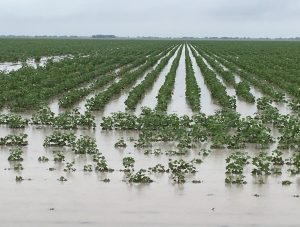
Cotton in Rio Grande Valley after Flash Flooding Last Week
House Passes 2018 Farm Bill – On Thursday June 21, the U.S. House of Representatives passed their version of the farm bill by a margin of 213-211. The narrow passage came one month after the bill first failed to pass due to a combination of unanimous Democratic opposition and Freedom Caucus horse-trading. Democrats opposed changes made to the Supplemental Nutrition Assistance Program (SNAP) that comprises the brunt of the fiscal obligations in the farm bill. The Freedom Caucus, aware that democratic opposition granted their caucus the number of votes to determine the bill’s passage, used their leverage to force the House to consider immigration legislation.
Hours before Thursday’s farm bill vote, the House voted down a conservative immigration bill by Representative Bob Goodlatte (R-Virginia) that would have, among other things, funded a border wall, instituted E-Verify standards for agricultural guest workers, and provided a path to citizenship for the recipients of Deferred Action for Childhood Arrivals known as “Dreamers.” After Rep. Goodlatte’s bill failed, the House postponed its previously scheduled vote on a more centrist immigration bill from Thursday to Friday.
Although the Democrats maintained their blanket opposition, enough members of the Freedom Caucus were satisfied with the House’s consideration of immigration legislation to pass the farm bill the second time around. This achievement was made possible by the diligent and steady leadership of House Agriculture Committee Chairman Mike Conaway (R-Midland), who has strived to craft a strong farm bill for a beleaguered rural America throughout this difficult and political process.
The Senate is expected to vote on the passage of their farm bill next week. Although there are expected to be harmful amendments filed during floor debate, the bill is expected to pass with less consternation than in the lower chamber. The Senate version does not contain any of the SNAP reforms that drove the House Democrats from the table and therefore all Senate Democrats are expected to follow their party colleagues on the Senate Agriculture, Nutrition & Forestry Committee who voted unanimously for the bill.
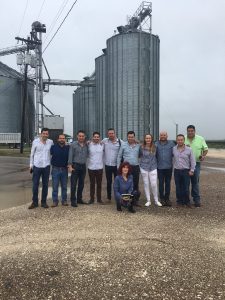
Mexico Buyer Team
Mexico Buyer Team Visits Texas – This week a group of ten buyers from various regions of Mexico visited the Gulf Coast and upper Gulf Coast region of Texas to meet with potential sellers of grain sorghum and to assess the current crop that awaits harvest. “While Mexico has not been the primary buyer of grain sorghum in the past few years, they remain a very viable and important market to our growers as various trade issues come and go,” said Wayne Cleveland, Executive Director of Texas Grain Sorghum Producers Board. “It’s of great importance that we continue to provide educational as well as purchasing opportunities as trade agreements are being vetted. Mexico understands the importance of the nutritional benefits of feeding grain sorghum into their rations and are keen buyers of feed stuffs. They are a very developed market for our grain and we are providing the opportunity for them to make further purchases,” stated Cleveland.

Mexico Buyers enjoy steak dinner at Jim Massey IV Farms.
The group, in conjunction with the United Sorghum Checkoff Program and the US Grains Council, visited farms and ports along the Texas Coast. They also enjoyed a steak dinner complete with grain sorghum dishes with the backdrop of a scenic view of a sorghum field awaiting harvest. After the Texas portion of the trip, the group spent several days in Kansas where they toured various farms and a visit to the International Grains Program Institute of Kansas State University as well as an ethanol plant.
Luckett makes Move – Katelyn’s husband recently graduated from Texas A&M’s College of Veterinary Medicine and they have moved to Muleshoe, Texas to pursue his veterinary career. After four years with Texas Sorghum Katelyn’s last day was May 31. She has accepted a new position with Muleshoe Vet Supply and she looks forward to continuing to work closely with producers in this new capacity. Katelyn is in good health and would like to sincerely thank everyone for their prayers, patience and support during her battle with cancer. If you’d like to reach Katelyn, her cell phone number has not changed and she hopes to see some of you at MVS!
May 25, 2018
Trade Talks with China Continue—Last week, the sorghum industry welcomed news that the 178 percent tariff and anti-dumping and countervailing duty investigations were dropped. Trade talks between the two countries continued this week, showing signs that China has promised to help reduce the trade surplus by purchasing more U.S. agriculture and energy products. There are many questions being raised about those logistics, and details around the timeline and amount of increased purchasing are still looming. USDA officials have been working closely with the Trump Administration to provide information on potential products that China could buy. President Trump is pushing a $25 billion increase on U.S. agricultural products. NSP Remains engaged in these discussions and is cautiously optimistic, knowing there are a lot of ups and downs possible as negotiations continue the first week of June.
Clock Ticking on NAFTA Re-Negotiation—Last week on May 17, Speaker of the House Paul Ryan’s proposed deadline for the office of the United States Trade Representative to submit a new NAFTA agreement came and went. Negotiators from the three countries worked diligently over the last few weeks to finalize terms in the 24-year-old trade agreement but were unable to resolve a handful of the most contentious chapters – including agricultural provisions.
Speaker Ryan set the original deadline of May 17 based on the Trade Promotion Authority (TPA), which provides for a strict timeline of consideration in order for the final agreement to be eligible for a simple “yes/no” vote in Congress without the possibility for any amendments by members of Congress.
With mid-term elections in November expected to dramatically reshape the partisan makeup of Congress, Speaker Ryan’s deadline reflected the time required for this current Congress to be able to consider the new NAFTA. Speaker Ryan has since walked back the May 17 deadline, suggesting if an agreement is submitted to Congress in the next month, this Congress might still be able to approve it. Here is a helpful walkthrough of the steps still required by TPA. If the International Trade Commission does not use their entire allotted days for review and analysis, there still might be time for this Congress to approve the agreement. Otherwise, it will almost certainly be decided in 2018, possibly by a Congress with dramatically different priorities than the current one.
Export Report—Export sales were strong again this week with Mexico, South Africa and unknown destinations committing to purchase 1.2 million bushels. Shipments also continued with Mexico, South Africa, Taiwan and Vietnam taking delivery of more than 400,000 bushels. Basis at the Gulf was somewhat softer although still significantly higher than before China terminated its investigation. The gap between the basis available at port vessels and country elevators remained wide.
GMO labeling draft rules published. The USDA has published its proposed GMO food labeling rule. Once finalized and published, this federal law will pre-empt all state-level GMO labeling regulations. Public comment on the draft rule is currently open through July 3, 2018. [View draft rule here.]
TPPA Conference set for December—The 30th Annual Texas Plant Protection Conference will take place December 4-5 at the Brazos Center in Bryan. “The theme for the conference is Innovations in Texas Agriculture for a Profitable Ag Future,” said Dr. Kranthi Mandadi, TPPA President. “With this theme, we are pleased with the lineup of outstanding speakers that will kick off our two-day December conference.”
Dr. Patrick Stover, Vice Chancellor and Dean, College of Agriculture, Texas A&M University will begin the conference with a welcome and introductory comment. The Texas State Representative for the Bryan-College Station area, Kyle Kacal will then give an update on state legislation that will have an impact on Texas agriculture.
Next, Economist and Futurist Dr. Jay Lehr, Science Director, Heartland Institute will be the keynote speaker. “Mega Trends in Agriculture” is his topic. Mike Johnson, Head, Crop Protection Field Development at Syngenta Crop Protection will discuss “Innovations in Ag Research and Development.” Following his presentation, Loren Wernette, Manager, Ag Digital Solutions with BASF will present on “Agricultural Marketing in the Digital Age”. After lunch, three Texas A & M AgriLife Research and Extension personnel will present on innovations that will have an impact on Texas agriculture in the future.
These presentations are:
- “Unlocking Yield Potential by Translating Crop Microbiome Research into Healthier Soils and Biorational Products”, – Betsy Pierson, Microbe Interactions, Department of Horticultural Sciences, Texas A&M University
- “Adapting Remote Sensing from Research to Ag Applications”, – Juan Landivar, Resident Director, Texas A & M AgriLife Research & Extension, Corpus Christi & Weslaco, TX, et al
- “Gene Drive Applications to Agriculture in Texas: Knowledge, Perceptions, and Values”, – Zach Adelman, Associate Professor, Entomology Department, Texas A & M University
Following the opening session, there will be breakout sessions on: new technology and chemistry, pest identification, laws and regulations, cotton, fertility management, grain, horticulture/turf, pasture and rangeland and precision ag.
For additional information: www.texasplantprotection.com or email tppa@consolidated.net
Foundation Scholarships Due June 1—The Bruce Maunder Sorghum Leadership Scholarship, Darrell Rosenow Memorial Scholarship and Sorghum Feed and Food Scholarship are all due June 1 to Foundation Director Larry Lambright. Scholarships can be turned in via email to larry@sorghumgrowers.com or postmarked by June 1. More on the scholarships can be found on the National Sorghum Producers website.
May 11, 2018
U.S. Grains Council, Industry Engage International Buyers on U.S. Sorghum—After China announced a 178.6 percent tariff in a preliminary decision on the anti-dumping case just a few weeks ago, ships loaded with U.S. sorghum needed new destinations. An industry-wide effort between National Sorghum Producers, the Sorghum Checkoff, U.S. Grains Council and state sorghum associations to reroute grain has been critical. Read more about USGC and industry efforts and details on shipments here.
Export Report—Exports were firm this week as traders continued rerouting sorghum originally destined for China. Based on relationships built over the past two months, Spain purchased and immediately took delivery of 5.2 million bushels. Mexico committed to purchasing 3.0 million bushels bringing the total number of international buyers of U.S. sorghum to a near-record 10. Export sales are still on pace to reach the USDA target, which remained 245 bushels in yesterday’s World Agricultural Supply and Demand Estimates report. As expected, the void created when China departed the market has led to numerous opportunities to interact with new buyers, and several trade missions are scheduled to continue building on these opportunities.
USDA says GMO food labeling rule moving forward, but likely not complete by July deadline—Secretary Perdue said that although the USDA has been working on the required regulation for labeling bio-engineered food, it is unlikely to be completed before the July 29 deadline. Perdue says that the delay is due in part to waiting to hear back from the Office of Budget Management on the draft rule. According to at least one lobbyist, it will likely be the end of 2018 before the draft rule is published. For additional information, click here. This article first appeared on the Ag Law Blog
NSP Board Directors Application Due Today—Applications to the National Sorghum Producers board of directors are due today, Friday, May 11. Candidates for the board must be a member of the National Sorghum Producers and have a passion for working on behalf of sorghum growers through lobbying and fundraising activities. The NSP board is not limited to growers, and there is no experience necessary to apply. If you have a desire to improve the sorghum industry through one of the four available leadership positions, NSP encourages you to apply. Applications are available at SorghumGrowers.com and will be accepted until 5:00 p.m. CST on May 11, 2018. Contact Debra Lloyd at 806-749-3478 if you have any questions.
April 20, 2018
Statements on Preliminary Duties from China Against U.S. Sorghum— “National Sorghum Producers is deeply disappointed in the preliminary antidumping determination issued today by China’s Ministry of Commerce (MOFCOM). U.S. sorghum is not being dumped in China, and U.S. sorghum producers and exporters have not caused any injury to China’s sorghum industry.
“National Sorghum Producers, alongside our producers, stakeholders and partners, has cooperated fully with China’s antidumping and countervailing duty investigations, including submitting several thousand pages of data demonstrating conclusively that U.S. sorghum is neither dumped nor causing any injury to China. None of this information appears to have been seriously considered or used in today’s preliminary determination, which is neither fair nor appropriate.
“We continue to greatly value our Chinese customers and what has been a win-win business relationship between U.S. sorghum producers and our Chinese partners. Today’s decision in China reflects a broader trade fight in which U.S. sorghum farmers are the victim, not the cause. And U.S. sorghum farmers should not be paying the price for this larger fight.
“Understanding the serious impact this preliminary decision will have on our farmers, NSP and our partners will continue to demonstrate U.S. sorghum farmers are not injuring China. We are evaluating all legal options moving forward.”
Secretary Perdue also released the following statement Wednesday:
“The international grain market is about the freest market there is, and it is ludicrous to even mention ‘dumping,’ because China can buy product from anywhere they choose. This is clearly a political decision by the Chinese and we reject their premise. Our sorghum producers are the most competitive in the world and we do not believe there is any basis in fact for these actions. As we explore options, we are in communication with the American sorghum industry and stand united with them. The fact remains that China has engaged in unfair trade practices over decades and President Trump is correct in holding them accountable. We remain committed to protecting American agricultural producers in the face of retaliatory measures by the Chinese.”
Farm Bill Passes House Committee—On Wednesday, the House Committee on Agriculture passed the 2018 Agriculture and Nutrition Act along party lines. Republicans voted to advance the legislation out of committee after listening to hours of bitter frustrations from Democrats about being excluded from the drafting process. The Democrats’ primary grievance was related to new provisions within Title IV of the Farm Bill that will create state-level programs to help Supplemental Nutrition Assistance Program (SNAP) beneficiaries receive work training. Democrats felt that as a result of their being left out of the drafting process the legislation did not pay enough attention to the details and that many SNAP recipients who do not deserve to lose their benefits would fall through the cracks.
Commodity organizations across the country praised Chairman Mike Conaway (R – Midland) for passing the legislation, which includes strong Title I provisions to assist producers in times of financial uncertainty. Chairman Conaway has now made it clear that his goal is to find enough votes in the House to pass the bill. Democrats have declared that they will not support the bill so long as the SNAP work training programs remain in it. Chairman Conaway has indicated he would like the move the bill through the House floor by the end of May.
National Sorghum Foundation Scholarships Open—Applications for three Sorghum Foundation scholarships are now available. These scholarships all include a $1500 monetary scholarship award. The Bruce Maunder Sorghum Leadership Scholarship also includes an expense paid trip to Washington, D.C. to accompany NSP leadership on their annual D.C. fly-in which takes place early February 2019. Scholarship information can be found here. Scholarship application packets must be postmarked by June 1 to be considered.
Cash Lease Rate in Texas—Each year, NASS surveys landowners and producers about current lease rates and, in August, publishes a report of the average lease rates (price per acre per year) for irrigated cropland, non-irrigated cropland, and pastureland for the United States and each state. For example, in 2017, nationwide averages were reported as $212 per acre per year for irrigated cropland, $123 for non-irrigated cropland, and $12.50 for pastureland. In Texas, the average lease rates were $87 for irrigated cropland, $28 for non-irrigated cropland, and $6.60 for pastureland (available at here). Every other year, NASS breaks down this data further by reporting data by district within a state and by county. This report is available in September of even-numbered years. Texas is divided into 15 districts, and average cash rent values reported for each one. For example, for the Northern High Plains in 2016, cash lease rates were reported as $113 for irrigated cropland, $22 for non-irrigated cropland, and $7.80 for pastureland. Similar results are available for each district on the USDA–NASS website (available at here). NASS also maintains a database including data analyzed by county for each even-numbered year. For example, average reported lease rates in Dallam County for 2016 are $97.50 for irrigated cropland, $55.50 for non-irrigated cropland, and $6.10 for pastureland. This piece first appeared in the Texas Ag Law Blog. To read the entire story, click here.
NSP Accepting Applications for Board Directors
National Sorghum Producers is accepting applications from candidates who wish to serve on the board of directors. Candidates for the board must be a member of the National Sorghum Producers and have a passion for working on behalf of sorghum growers through lobbying and fundraising activities. The NSP board is not limited to growers, and there is no experience necessary to apply. If you have a desire to improve the sorghum industry through one of the four available leadership positions, NSP encourages you to apply. Applications are available at SorghumGrowers.com and will be accepted until 5:00 p.m. CST on May 11, 2018. Contact Debra Lloyd at 806-749-3478 if you have any questions.
April 6, 2017
China Tariffs—This week, China announced another schedule of tariffs in response to the United States’ $50 billion tariffs stemming from a Section 301 investigation into Chinese policies regarding the forced transfer of intellectual properties. About one-third of the products on the newest round of Chinese tariffs are agricultural, amounting to roughly $17 billion worth of Chinese imports. These agricultural products include soybeans, corn and corn products, wheat, sorghum, cotton, beef and beef products, cranberries, orange juice, and tobacco and tobacco products. The proposed tariff level is 25%. No timetable has been established for when these most recent schedules of both American and Chinese tariffs will take effect.
In response to the announcement of these tariffs, National Sorghum Producers Chairman Don Bloss released a statement, which is excerpted below and can be read in its entirety here:
“Trade wars are not good for anyone, and we urge President Trump and other negotiators to take a constructive approach in the ongoing negotiations that do not threaten more harm to U.S. sorghum producers. Our hope is that this situation will be resolved sooner rather than later. Sorghum is good for U.S. farmers and traders, and good for China.”
Auxin Training—Since January more than 100 auxin training meetings have been scheduled across the state. This training was mandated by the EPA for all individuals who will be applying three newly formulated dicamba products because of a large number of off-target movement claims that occurred across several states in 2017. The three newly registered low-volatility dicamba herbicides are: XtendiMax® herbicide with VaporGrip® Technology (Monsanto, which received federal approval in November 2016), Engenia® Herbicide (BASF, approved December 2017), and DuPont® FeXapan® herbicide Plus VaporGrip® Technology (approved February 2017). In late 2017, EPA approved label revisions for these products, which are set to expire in November/December of 2018. Label renewals will depend largely on on-target application success in 2018. This training applies to all labeled uses of these herbicides. Enlist Duo™ and Enlist ONE™ are not a part of this required training, although the principles of on-target application can be applied to all herbicide applications. This training not only satisfies the federal requirement but also satisfies the Texas Department of Agriculture requirement for auxin specific training. For more information click here or to find a meeting in your area click here.
Evaluating Benefits of a Sorghum-Cotton Rotation to Encourage Sorghum Re-Expansion in the Rolling Plains—Principal Investigator: Curtis Adams; this research was funded by the Texas Grain Sorghum Producers Board
Grain sorghum was historically a major crop in the Rolling Plains region of north-central Texas. Due to a variety of factors, grain sorghum acreage declined in the region and monocropping of cotton became the predominant summer cropping system. But the current continuous cotton system is prone to inefficiency and it degrades the land. In the experiment, a sorghum-cotton rotation, including both sequences of the crop rotation (i.e. sorghum-cotton and cotton-sorghum), were compared to a continuous cotton cropping system in dryland conditions. To determine potential benefits of the rotation with sorghum, the following assessments of the treatments were made: annual determination of crop productivity and yield; year-round measurement of soil moisture content; annual determination of soil nitrogen and carbon; and a simple annual assessment of variable input costs and proceeds based on local economic factors. In the initial two years of the project, environmental conditions varied widely between years. The first year, 2016, was a successful cropping season for producers in the Rolling Plains region and yields were good. In 2017, sorghum was planted in early May, but a prolonged dry period following planting reduced sorghum yield and prevented planting of cotton for more than a month and a half. Cotton was finally planted in late June, but an earlier than average frost caused failure of the cotton crop. Economic analysis showed that potential economic returns are greater for cotton than grain sorghum, but potential losses are also greater.
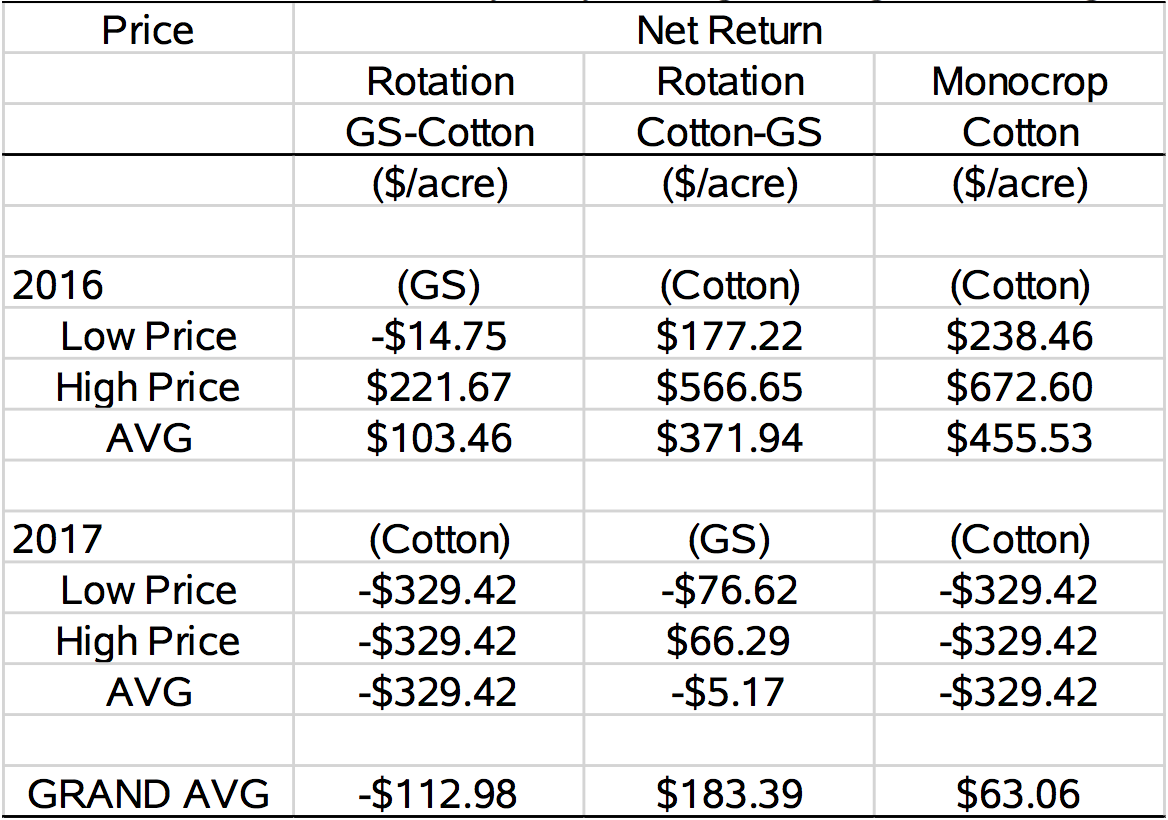
Fig. 1 Economic analysis showing estimates of net returns for grain sorghum-cotton rotational systems (differing in sequence) and continuous (monocrop) cotton. The analysis is based on data collected in the project from 2016 and 2017. Both low and high price estimates are shown, with yearly averages and grand averages calculated. (GS, grain sorghum.)
Due to crop failure in cotton in 2017, the greatest net economic return in the study was obtained in the cotton-sorghum cropping system as compared to continuous cotton and the sorghum-cotton system (by virtue of crop timing). Soil moisture data suggested that surface soil moisture was greater following sorghum than following cotton; continued data collection in future years will help to clarify the impact of this. The higher soil moisture may have been the result of higher surface residue following sorghum, which aided in increasing water infiltration and reducing evaporation.

Fig. 2 Soil moisture content at eight depths, 0 to 160 cm, over the course of time in three systems. The labeled bars towards the top of each graph signify the period over which the respective crops were grown in each system.
Section 18 Granted for Transform in Multiple States in 2018—Sorghum farmers in Texas, Kansas, Arkansas, Louisiana, Alabama, Colorado, Mississippi, Oklahoma and Virginia have all been granted Section Emergency Use Exemption for the use of sulfoxaflor on grain sorghum for the 2018 growing season. Sulfoxaflor is the active ingredient in Transform WG and gives sorghum farmers more flexibility when treating for the sugarcane aphid. Learn more at DefendYourCrop.com.
March 23, 2018
Trump Announces New Tariffs on Chinese Goods—On March 22, President Trump announced that the Office of the United States Trade Representative had concluded its investigation into China’s practices regarding the transfers of intellectual property and technology. Under the rarely invoked Section 301 of the Trade Act of 1974, the federal government has the authority to take action against practices by foreign governments that violate international trade agreements or burden American commerce.
Upon conclusion of this investigation, the President authorized the USTR to pursue $60 billion worth of tariffs on Chinese goods and investments. Although this outcome did not come as a surprise, it arrives at an already turbulent time in United States’ trade policy. In a statement, the United States Grains Council, of which Texas Grain Sorghum Producers is a member, said, “While we are not surprised, we are dismayed at new tariffs announced today by the Trump Administration against China, which will almost certainly prompt immediate and painful retaliation against U.S. agriculture.”
USTR has not yet announced which Chinese exports they will target with these tariffs, but they are expected to release that list in the next 15 days. Experts fear that these new tariffs will result in reciprocal action against American exports, particularly agricultural goods. National Sorghum Producers continues to lead the sorghum industry and other stakeholders in full cooperation with the Chinese anti-dumping and countervailing duty investigations into American sorghum launched last month. Texas Grain Sorghum Association understands that this week’s unprecedented events only compound the already considerable levels of uncertainty regarding the nature of our relationship with China; TGSA is committed to providing you updates on the exhaustive efforts that are being undertaken in order to protect the interests of the sorghum industry.
Section 199A Fix Imminent—Lawmakers have reached a tentative deal to correct unintended consequences of a provision of the new tax-reform law that benefits cooperatives. There remain concerns on whether the bill can be attached to the FY18 omnibus spending bill to be considered later this month. The current deduction, intended to mimic and replace the benefits of the repealed Section 199, gives farmers more generous deductions when they sell directly to co-ops rather than privily-held or investor-owned companies. The provision has resulted in a competitive imbalance impacting numerous agricultural value chain stakeholders, including grain handlers, feed mills, seed companies, ag retailers, biofuels producers, banks, livestock marketers and dairy processors. The new legislation is intended to restore the benefit of the old Section 199 while providing some of the additional benefits cooperatives received in Section 199A.
FMCSA Extends Agricultural Exemption to New Hauling Regulations—The Federal Motor Carrier Safety Administration (FMCSA) announced that it will extend the current waiver of the new hauling rules related to hours of service another 90 days, extending the waiver period through June 18, 2018. This means that the new regulations related to hours of service and electronic logging devices will not apply to people hauling agricultural commodities, supplies, livestock, or horses. The waiver does not apply to the rules regarding Commercial Drivers Licenses (CDLs) for agricultural haulers. [Read announcement here.]
March 9, 2018
Incumbents Face, Largely Survive, Wave of Primary Challengers—On Tuesday, March 6 Texans from all parties lined up to vote in primary elections ahead of the fall 2018 midterms. Given Texas’s status as the first state in the nation to hold primary elections, the results were widely reported on by national media as a bellwether of President Trump’s approval in a traditionally conservative state. However, to Texans and those focused on the state legislature, this week’s elections were a test of a different phenomenon: the influence of far-right campaigns against moderate Republican incumbents.
When five-time Speaker of the House Joe Straus, a moderating force within the Republican party, announced last October he would not seek reelection in 2018, many in the far-right saw their opportunity to seize the political influence that Speaker Straus had denied them in the past. Although certain groups such as Empower Texans pumped more money into candidates challenging moderate incumbents than most, these challengers were supported and motivated by many different figures and factors.
Before breaking down the various challenges to moderate incumbents, it’s important to note that one race was unique in both the backing of the challenger and its importance to Texas agriculture. In his challenge for Commissioner of Agriculture, Austin-based lobbyist Trey Blocker, who was largely self-financed and was not a priority of groups seeking to oust moderate Republicans, was soundly defeated by incumbent Sid Miller. Blocker campaigned as the more conservative alternative to Commissioner Miller. Key tenets of Blocker’s campaign included promises to reverse the Texas Department of Agriculture’s unpopular fee increases, harsher treatment of undocumented immigrants, and an all-around reduction of the Department’s services. Blocker’s message, however, failed to resonate with voters and he fell to third place in the primary results, behind former Democratic Agriculture Commissioner candidate Jim Hogan, who refused to fundraise or campaign. Commissioner Miller received 56% of the vote, avoiding a runoff and almost certainly securing his second term as Texas Agriculture Commissioner.
When looking at state house and state senate races, two common themes emerge. There are races where far-right groups applied pressure on incumbents and there are races where Republican party leaders applied pressure on incumbents. Each of these approaches had mixed results, but incumbents were largely successful in defending their seats.
In the case of the former (far-right groups supporting challenges to moderates) there were two notable races in the house. Representative Charlie Geren (R-Fort Worth), chairman of the House Administration committee and close ally of Speaker Straus, won 57%-43% against Bo French, one of Empower Texans’ top candidates. Representative Ken King (R-Canadian) also successfully defended his seat against an Empower Texans’ candidate, avoiding a runoff against Jason Huddleston by a mere 103 votes.
Statewide Republican leaders also supported challenges to moderate incumbents. In the House, Governor Greg Abbott campaigned and financed challengers to three Republicans: Representative Sarah Davis (R-West University Place), Representative Lyle Larson (R-San Antonio), and Representative Wayne Faircloth (R-Galveston). Despite the Governor’s intervention, though, Representatives Davis and Larson each won by more than ten percentage points. Representative Faircloth was defeated by Mayes Middleton, an oilman who also enjoyed the financial backing of Empower Texans.
In the Senate, Lieutenant Governor Dan Patrick played a role in two important primary races. After tensions between the Lt. Governor and Senator Kel Seliger (R-Amarillo) over state support for public schools, each of the Republicans decided to stay out of each other’s campaigns. Senator Seliger was the only Republican not to endorse Lt. Governor Patrick (although he did not endorse his challenger, either) and Lt. Governor Patrick did not publicly intervene in Senator Seliger’s race. However, Lt. Governor Patrick is a close ally of Empower Texans, who pumped significant money into Midland Mayor Mike Canon’s challenge and one of Lt. Governor Patrick’s top consultants was reported to be employed by Senator Seliger’s second challenger, restaurateur Victor Leal. Senator Seliger avoided a runoff with Mike Canon by just 322 votes. Lt. Governor Patrick was considerably more involved in Representative Pat Fallon’s challenge to incumbent Senator Craig Estes (R-Wichita Falls), both contributing funds and conducting polling for the three-term House member. Representative Fallon rode that support to a resounding victory over Senator Estes, winning 62% of the vote to Senator Estes’s 22%.
There were many other noteworthy results this week from across the state. The Texas congressional delegation is facing its largest turnover in decades, and many of those races were effectively determined on Tuesday. If you have any questions about these results, what the state of any races headed into the general election this fall, or would like to discuss the above races further, please contact Patrick Wade at patrick@texassorghum.org.
Transform WG Receives Section 18—Recently, the EPA granted a Section 18 emergency use exemption for Transform WG insecticide for use on sorghum. Sates receiving approval included Texas, Alabama, Louisiana and Mississippi. Applications for Section 18 emergency exemptions in additional sorghum-producing states are pending. For more information, click here.
Leadership Sorghum Class IV Application Deadline Next Week—The Sorghum Checkoff is accepting applications for Leadership Sorghum Class IV, a program designed to develop the next generation of sorghum leaders. During the 15-month leadership program, class members will be exposed to various aspects of the sorghum industry in addition to personal development and networking opportunities. Class members will participate in both hands-on and classroom-style learning experiences to gain an understanding of how sorghum moves through the value chain, how checkoffs and stakeholder organizations interact on behalf of the industry and what the future holds for sorghum. Eligible applicants must be farmers actively engaged in sorghum production in the United States. Fifteen growers will be accepted into the program’s fourth class. Applications are due by 5:00 p.m. March 16, 2018. Applications, class schedule and program criteria can be found here.
Export Report—Shipments for the week reached an all time high with China taking the delivery of 16.6 million bushels. Japan also taking deliveries this week and these shipments bring total shipments for the marketing year up to 134.8 million bushels. We have already shipped approximately 55 percent of the project export total for the marketing year. Texas Gulf bids are 110 percent of corn or $5.11 per bushel at the vessel. This does not reflect farmer price but instead is a representation of what exporters are willing to pay. This premium has declined over the last few weeks but remains in place as sorghum is being shipped at a rapid pace. Basis has also softened further north where central Kansas terminals are now bidding -50 for sorghum. However, corn bids are -45 so interior feed grain basis overall has softened.
HPWD Accepting Water Depletion Data Requests—With tax season upon us, HPWD is now accepting requests for data to claim a cost-in-water income tax depletion allowance. This yearly program uses annual water level measurements to determine changes in the water table throughout the District. The information is then made available to land owners for use in preparation of their taxes to determine if a loss of water under their property may constitute a tax break. For more information, click here.
February 20, 2018
NSP Update—National Sorghum Producers continued steps this week to respond to the announcement of anti-dumping and countervailing duties investigations into imports of U.S. sorghum by the Chinese government. Our partners and stakeholders across the industry are working closely together to demonstrate that U.S. sorghum is not dumped into China, it is not unfairly subsidized and is not injuring China.
Meanwhile, it is important our producers know trade with China and other countries continues. Last week’s export report shows exports remaining strong with China committing to purchase 4.6 million bushels of sorghum. Japan also committed to purchase 421,239 bushels to bring the weekly total to just under 5.0 million bushels. Total commitments for the marketing year now stand at 212 million bushels, including 204 million bushels of commitments from China. Shipments were also strong with China taking delivery of 4.8 million bushels and Japan taking delivery of 303,962 bushels shipped from the Pacific Northwest. Basis has recovered from recent shocks driven by trade concerns. Here are select basis bids from around the country:
- Ohio River: +20 for immediate delivery (compared to +6 for corn)
- Texas Gulf Coast vessel price: +165 for March delivery (compared to +63 for corn)
- West Texas and eastern New Mexico: -10 for new crop (compared to -10 for corn)
- Central Oklahoma: -30 for immediate delivery (compared to -35 for corn)
- Central Kansas: -50 for new crop (compared to -45 for corn)
- Central South Dakota: -30 for immediate delivery (compared to -60 for corn)
Trade Surplus—As our government and governments around the world debate the merits of global free trade, it’s important to keep in mind agriculture’s role in bolstering the United States’ trade balance. While every other American industry sector maintains a trade deficit with other countries – both in the North American bloc and around the world – agriculture consistently runs a trade surplus. This is a testament to the quality of American-produced crops and a reminder of the significance of keeping these international markets accessible. Below are two charts provided by the United States Department of Agriculture Foreign Agricultural Service. These charts demonstrate the net value of traded agricultural goods in the United States. Take particular note of the widening gap between export and import values over the last decade or so, which indicates that, when provided fair market access, our agricultural goods are as internationally competitive as ever.
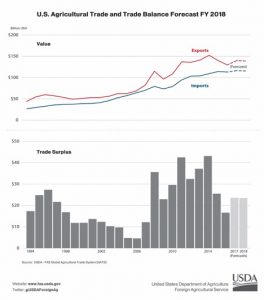
Sugarcane Aphid Management on Tolerant Hybrids— Investigators: Michael Brewer, Research Entomologist (Corpus Christi area site, all sites coordination and principal investigator; mjbrewer@ag.tamu.edu); Robert Bowling, Extension Entomologist (Corpus Christi area site /outreach); Allen Knutson, Extension Entomologist (Hunt County coordination); John Gordy, County Extension Agent (Rosenberg area site); Danielle Sekula-Ortiz (Rio Grande Valley area site/outreach;
This research was funded by Texas Grain Sorghum Producers Board
Well timed application(s) of an insecticide can protect high yielding aphid susceptible hybrids from economically damaging populations of sugarcane aphid when using an economic threshold of 50-75 aphids per leaf. Essential in using this strategy is to scout fields for aphids on at least a weekly basis and spray within a few days of exceeding threshold. The scouting card and insecticide use guidelines produced with support from the Texas Grain Sorghum Board helps guide this effort.
For those considering growing commercial ‘tolerant’ or ‘resistant’ hybrids, current season-long research confirms that most but not all of these hybrids express partial protection of plants from sugarcane aphid. With results from 2016 and 2017, we provide guidance on SCA management for these hybrids, under the good growing conditions we experienced in the past two seasons. For some of these hybrids, aphids can be tolerated above the original ET (see Guidance column in table). Here, ‘resistant/tolerant’ hybrids maintained good yield despite aphid presence between 100 and 200 aphids per leaf. For other hybrids, yield loss was seen or variable, justifying continued use of an ET of 50 aphids/leaf. Note, these may be good performing hybrids when aphids are absent or controlled. We advise additional testing of some of these hybrids to verify this work under a range of growing conditions and locations. Those listed as ‘additional testing needed’ have not been confirmed to be highly resistant or tolerant and caution is advised until further testing.
Regarding insecticides, Sivanto Prime (Bayer) at 4.0 fl.oz./ac. or Transform (Dow) at 1.0 oz./ac. is recommended for treatment of SCA. Continued monitoring of SCA is recommended following insecticide application to verify control.
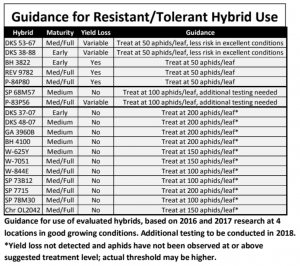
Changes in Base Acres—Part of the budget fix for cotton includes changes in base acres. Any generic base acres that have not been planted to a covered commodity, including program crops and cotton, from 2009-2016 become unassigned base acres making them ineligible for any Title I farm program payments. This will certainly raise additional base questions on expired CRP acres in the upcoming farm bill debate.
Plowing Through Food Facts—Texas Farm Bureau recently launched a new video campaign addressing misconceptions regarding agriculture. To see the video and webpage geared toward answering consumer questions, click here.
February 2, 2018
Texas Sorghum Joint Annual Meeting—Earlier this week, the Texas Grain Sorghum Producers Board (TGSB), Texas Grain Sorghum Association (TGSA) and delegate body hosted the third joint annual meeting for the organizations. The meeting took place in Austin in conjunction with the Texas Ag Form. Approximately 50 grain sorghum producers and industry leaders from across the state came together to discuss farm policy, research projects and issues facing sorghum. Austin Wayne Self, NASCAR Camping World Truck Series driver also stopped by the meeting to discuss his partnership with TGSB, United Sorghum Checkoff Program (USCP) and TDA through a Biofuels Infrastructure Program Grant (BIP).
“For me it’s more than a logo on a truck— I get to represent something I believe in,” says Self. “When you’ve got a bunch of fans up there it makes it personal. It’s estimated that NASCAR has 80 million Americans out there looking to support a driver and get behind something they believe in. That’s why I think sorghum is so interesting in NASCAR. It’s real easy– you’ve got ethanol fuel, motors and you’ve got trucks racing at peak performance, so it ties into something the fans understand.”
The grant funds were primarily used to install 782 E15 blender pumps throughout Texas at businesses such as H-E-B, along with storage tanks and infrastructure.

Austin Wayne Self speaks to TGSP and delegate body during their annual meeting in Austin.
Round Six of NAFTA Renegotiation Concludes—This week, negotiators from Canada, Mexico and the United States wrapped up the sixth formal round of talks for renegotiating the North American Free Trade Agreement in Montreal, Canada. The negotiations, which began in August of 2017, have often been tense and gridlocked, with each of the member nation’s respective political circumstances casting outsize shadows on the proceedings.
Although the ideology of President Donald Trump was the impetus driving renegotiation in the first place, Mexican presidential politics are beginning to guide the 2018 rounds of negotiation. Mexican negotiators are anxious to reach a conclusion before their presidential election this summer in order to improve the incumbent Institutional Revolutionary party’s standing, particularly in regards to avowed anti-NAFTA challenger Andres Manuel Lopez Obrador.
As far as agriculture is concerned, progress is being made towards a final agreement, but many hurdles remain to be cleared. Texts relating to sanitary and phytosanitary regulations on the border and the alignment of each country’s biotechnology regulations were nearly completed in this sixth round. These subjects, along with digital trade and other technological-based measures, have been considered the easiest to negotiate and so their advanced progress is to be expected.
Negotiations regarding thornier agriculture subjects, like market access for agricultural products and regulations on seasonal produce, still lag behind, with no country expressing improved optimism for their expedient resolution. There have also been discussions about attaching enforceable labor standards for Mexico to the agreement; Mexico insists that they are already progressing towards more humane standards and therefore no NAFTA benefits ought to be tethered to additional requirements.
The seventh round of negotiations is set for the end of February in Mexico City. The hosts hope to make substantial progress at this round ahead of their aforementioned presidential election. At least two more rounds are expected after that, but some pessimistic trade analysts are already predicting talks will linger into 2019. No matter how long they last, TGSA will continue to monitor and report developments in the negotiations.
Leadership Sorghum— The Sorghum Checkoff is accepting applications for Leadership Sorghum Class IV, a program designed to develop the next generation of sorghum leaders. Eligible applicants must be farmers actively engaged in sorghum production in the United States. Fifteen growers will be accepted into the program’s fourth class. The application for the program as well as more information is available at LeadSorghum.com. Deadline is 5:00 p.m. on March 16, 2018.
Applications Available for Young Farmer Grants—The Texas Department of Agriculture (TDA) is now accepting applications for Young Farmer Grant (YFG), a program under the direction of Texas Agricultural Finance Authority (TAFA). The purpose of this program is to provide financial assistance in the form of dollar-for-dollar matching grant funds to individuals between the age of 18 and 46 years old who are engaged or will be engaged in creating or expanding an agricultural business in Texas. Additional details, instructions and the 2018 Round 2 application materials can be found here. Applications are due by the close of business Thursday, March 22, 2018.
Export Report –Export sales were firm again last week with China and Korea committing to purchase 6.5 million bushels of sorghum. Total commitments now stand at 194 million bushels. Shipments were also strong with China and Mexico taking delivery of 8.6 million bushels. Price stayed strong with Gulf premiums for sorghum at 27 percent. The northern plains was firm, as well.
January 19, 2018
2018 Planting Decisions—The following information was provided by USCP’s Director of Agronomy, Brent Bean. As growers begin to make planting decisions here are some things to think about when considering planting grain sorghum:
- Sorghum export prices continue to soar. Most recently, based on Market Perspectives Information Report from January 11, 2018, FOB sorghum export bids reflect a 25.6 percent premium above FOB corn export bids. These high sorghum bids continue to show exports remain strong, and prices are encouraging sorghum to be pulled from the interior countryside.
- Much of the historical grain sorghum regions of the U.S. are suffering from drought. Unfortunately, the National Weather Service Climate Prediction Centeris predicting hotter and drier conditions for much of this region for the next few months. Although sorghum responds positively to good moisture conditions, it has a well deserved reputation as a drought tolerant crop.
- Sugarcane aphid was much less of a problem in 2017 than in the past. Although it is impossible to predict at this point what 2018 will bring, there are reasons to be optimistic. The planting of more tolerant hybrids, coupled with better management practices that include timely insecticide application are making a significant difference. In addition, beneficial insect populations that prey on the sugarcane aphid are adapting to the presence of the aphid and appeared in increasing numbers in 2017. There is no reason to think that this will not continue in 2018.
- Sorghum has long been recognized as a good rotation crop for broadleaf crops such as cotton and soybean. However, sorghum is often not talked about as a rotational crop with corn. Below is a study conducted by Rick Kochenower, when at the Oklahoma State Experiment Station, near Goodwell. On average, corn yields were 26 bushels higher when following sorghum compared to continuous corn.

- Under irrigation, grain sorghum makes a good companion crop with other crops where circles are split in half. Planting dates can be manipulated in a way that provides irrigation water during the key development stages of each crop. This has the effect of maximizing water use efficiency for the cropping system.
Campaign Finance Reports Due as March Primary Draws Nearer—Campaign finance reports detailing the fundraising, expenditure, and outstanding loan totals for all candidates seeking public office in Texas and in the Texas congressional delegation were due on Tuesday January 16. Since 2000, these semi-annual reports, designed to increase campaign transparency by documenting the names, occupations, and amounts given for all contributions of greater than $100, are made public as they are filed. You can review the financials of any candidate here by selecting “By Filer Name,” and entering the last name of the candidate.
Some notable financial information made available this week:
- The Agriculture Commissioner Republican primary between incumbent Sid Miller and Austin-based ethics lobbyist Trey Blocker has been widely considered to be the most contentious of all statewide elections in 2018, and the financial reporting backs up that assessment. Miller raised $106,000 from July to December, while Blocker (who formally announced his candidacy in November) raised $50,000. Each of these candidates have loaned themselves hundreds of thousands of dollars. Blocker reported having a net amount of $487,000 cash on hand, slightly higher than Miller’s $402,000 cash on hand.
- Incumbents Governor Greg Abbott and Lieutenant Governor Dan Patrick are in much better positions relative to their challengers than Commissioner Miller. Abbott raised $9,000,000 from July to December, bringing his total cash on hand to $43,300,000, the most cash on hand ever reported by a Texas politician. Patrick brought in $2,700,000 in this period for a total of $18,000,000 cash on hand. None of the Governor or Lieutenant Governor’s challengers – in either party – reported raising more than $250,000 in this six month period.
- Senator Kel Seliger in Senate District 31 (stretching from parts of Midland/Odessa up to Amarillo) reported revenue of $528,000 for a total of $1,700,000 cash on hand. His main challenger, former Midland Mayor Michael Canon, reported raising $107,000 for a total of $170,000. Senator Seliger’s race is notable as he was the only Republican state senator to not endorse Lieutenant Governor Dan Patrick after the two frequently clashed over Seliger’s staunch support for public schools in rural Texas.
If you have any questions about the finances or state of upcoming elections, please reach out to Patrick Wade at Patrick@texassorghum.org.
Export Report—Export sales were very strong again last week with China committing to purchase 6.7 million bushels. This brings total commitments for the year to 180 million bushels or 69 percent of the USDA export target. Shipments were also strong as China and Mexico took delivery of 2.1 million bushels. Prices remain strong with central South Dakota sorghum priced at 111 percent of corn, central Kansas sorghum priced at 116 percent of corn and Gulf sorghum for export priced at $4.98 per bushel or 123 percent of corn.

